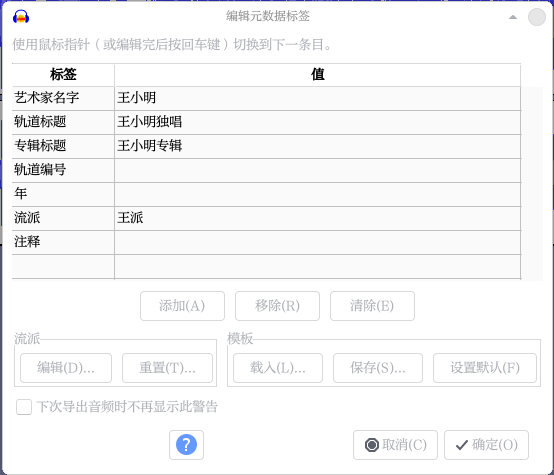A library for reading and writing ID3 metadata.
- ID3v1 reading
- ID3v2.2, ID3v2.3, ID3v2.4 reading/writing
- MP3, WAV and AIFF files
- Latin1, UTF16 and UTF8 encodings
- Text frames
- Extended Text frames
- Link frames
- Extended Link frames
- Comment frames
- Lyrics frames
- Synchronised Lyrics frames
- Picture frames
- Encapsulated Object frames
- Chapter frames
- Unsynchronisation
- Compression
- MPEG Location Lookup Table frames
- Unique File Identifier frames
- Tag and File Alter Preservation bits
use id3::{Tag, TagLike};
fn main() -> Result<(), Box<dyn std::error::Error>> {
let tag = Tag::read_from_path("testdata/id3v24.id3")?;
// Get a bunch of frames...
if let Some(artist) = tag.artist() {
println!("artist: {}", artist);
}
if let Some(title) = tag.title() {
println!("title: {}", title);
}
if let Some(album) = tag.album() {
println!("album: {}", album);
}
// Get frames before getting their content for more complex tags.
if let Some(artist) = tag.get("TPE1").and_then(|frame| frame.content().text()) {
println!("artist: {}", artist);
}
Ok(())
}use id3::{Error, ErrorKind, Tag, TagLike, Version};
use std::fs::copy;
fn main() -> Result<(), Box<dyn std::error::Error>> {
let temp_file = std::env::temp_dir().join("music.mp3");
copy("testdata/quiet.mp3", &temp_file)?;
let mut tag = match Tag::read_from_path(&temp_file) {
Ok(tag) => tag,
Err(Error{kind: ErrorKind::NoTag, ..}) => Tag::new(),
Err(err) => return Err(Box::new(err)),
};
tag.set_album("Fancy Album Title");
tag.write_to_path(temp_file, Version::Id3v24)?;
Ok(())
}use id3::{Tag, TagLike, Frame, Version};
use id3::frame::Content;
use std::fs::copy;
fn main() -> Result<(), Box<dyn std::error::Error>> {
let temp_file = std::env::temp_dir().join("music.mp3");
copy("testdata/quiet.mp3", &temp_file)?;
let mut tag = Tag::new();
tag.set_album("Fancy Album Title");
// Set the album the hard way.
tag.add_frame(Frame::text("TALB", "album"));
tag.write_to_path(temp_file, Version::Id3v24)?;
Ok(())
}use id3::{Tag, TagLike, partial_tag_ok, no_tag_ok};
fn main() -> Result<(), Box<dyn std::error::Error>> {
let tag_result = Tag::read_from_path("testdata/id3v24.id3");
// A partially decoded tag is set on the Err. partial_tag_ok takes it out and maps it to Ok.
let tag_result = partial_tag_ok(tag_result);
// no_tag_ok maps the NoTag error variant and maps it to Ok(None).
let tag_result = no_tag_ok(tag_result);
if let Some(tag) = tag_result? {
// ..
}
Ok(())
}Do you think you have found a bug? Then please report it via the GitHub issue tracker. Make sure to attach any problematic files that can be used to reproduce the issue. Such files are also used to create regression tests that ensure that your bug will never return.
When submitting pull requests, please prefix your commit messages with fix: or feat: for bug
fixes and new features respectively. This is the
Conventional Commits scheme that is used to
automate some maintenance chores such as generating the changelog and inferring the next version
number.
Tests require ffprobe (part of ffmpeg) to be present in $PATH.
cargo test --all-features






